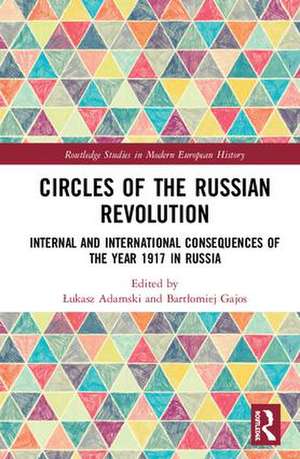Circles of the Russian Revolution: Internal and International Consequences of the Year 1917 in Russia: Routledge Studies in Modern European History
Editat de Łukasz Adamski, Bartłomiej Gajosen Limba Engleză Hardback – 6 iun 2019
| Toate formatele și edițiile | Preț | Express |
|---|---|---|
| Paperback (1) | 328.37 lei 6-8 săpt. | |
| Taylor & Francis – 31 mar 2021 | 328.37 lei 6-8 săpt. | |
| Hardback (1) | 844.81 lei 6-8 săpt. | |
| Taylor & Francis – 6 iun 2019 | 844.81 lei 6-8 săpt. |
Din seria Routledge Studies in Modern European History
-
 Preț: 288.80 lei
Preț: 288.80 lei -
 Preț: 341.55 lei
Preț: 341.55 lei -
 Preț: 342.58 lei
Preț: 342.58 lei - 9%
 Preț: 935.39 lei
Preț: 935.39 lei -
 Preț: 311.41 lei
Preț: 311.41 lei - 9%
 Preț: 934.94 lei
Preț: 934.94 lei -
 Preț: 311.47 lei
Preț: 311.47 lei - 18%
 Preț: 1057.09 lei
Preț: 1057.09 lei - 18%
 Preț: 1124.39 lei
Preț: 1124.39 lei - 26%
 Preț: 846.50 lei
Preț: 846.50 lei -
 Preț: 430.37 lei
Preț: 430.37 lei -
 Preț: 369.73 lei
Preț: 369.73 lei - 18%
 Preț: 1056.28 lei
Preț: 1056.28 lei - 18%
 Preț: 1062.98 lei
Preț: 1062.98 lei - 15%
 Preț: 461.03 lei
Preț: 461.03 lei - 26%
 Preț: 820.92 lei
Preț: 820.92 lei -
 Preț: 452.15 lei
Preț: 452.15 lei - 18%
 Preț: 942.65 lei
Preț: 942.65 lei - 18%
 Preț: 1113.12 lei
Preț: 1113.12 lei - 26%
 Preț: 765.19 lei
Preț: 765.19 lei - 26%
 Preț: 766.27 lei
Preț: 766.27 lei - 18%
 Preț: 1113.12 lei
Preț: 1113.12 lei - 26%
 Preț: 764.20 lei
Preț: 764.20 lei -
 Preț: 275.87 lei
Preț: 275.87 lei - 18%
 Preț: 1188.89 lei
Preț: 1188.89 lei - 18%
 Preț: 910.22 lei
Preț: 910.22 lei - 18%
 Preț: 1108.37 lei
Preț: 1108.37 lei - 18%
 Preț: 1120.20 lei
Preț: 1120.20 lei - 18%
 Preț: 1004.20 lei
Preț: 1004.20 lei - 18%
 Preț: 1055.51 lei
Preț: 1055.51 lei - 25%
 Preț: 824.80 lei
Preț: 824.80 lei -
 Preț: 485.40 lei
Preț: 485.40 lei - 26%
 Preț: 821.53 lei
Preț: 821.53 lei - 25%
 Preț: 796.11 lei
Preț: 796.11 lei - 18%
 Preț: 2230.89 lei
Preț: 2230.89 lei - 26%
 Preț: 822.36 lei
Preț: 822.36 lei - 18%
 Preț: 1057.75 lei
Preț: 1057.75 lei - 26%
 Preț: 736.38 lei
Preț: 736.38 lei - 18%
 Preț: 1066.09 lei
Preț: 1066.09 lei - 26%
 Preț: 764.20 lei
Preț: 764.20 lei - 18%
 Preț: 1058.65 lei
Preț: 1058.65 lei -
 Preț: 438.05 lei
Preț: 438.05 lei -
 Preț: 446.32 lei
Preț: 446.32 lei - 18%
 Preț: 703.93 lei
Preț: 703.93 lei - 18%
 Preț: 1116.27 lei
Preț: 1116.27 lei
Preț: 844.81 lei
Preț vechi: 1030.25 lei
-18% Nou
Puncte Express: 1267
Preț estimativ în valută:
161.67€ • 168.58$ • 134.37£
161.67€ • 168.58$ • 134.37£
Carte tipărită la comandă
Livrare economică 20 martie-03 aprilie
Preluare comenzi: 021 569.72.76
Specificații
ISBN-13: 9781138385122
ISBN-10: 1138385123
Pagini: 294
Ilustrații: 1
Dimensiuni: 156 x 234 x 23 mm
Greutate: 0.68 kg
Ediția:1
Editura: Taylor & Francis
Colecția Routledge
Seria Routledge Studies in Modern European History
Locul publicării:Oxford, United Kingdom
ISBN-10: 1138385123
Pagini: 294
Ilustrații: 1
Dimensiuni: 156 x 234 x 23 mm
Greutate: 0.68 kg
Ediția:1
Editura: Taylor & Francis
Colecția Routledge
Seria Routledge Studies in Modern European History
Locul publicării:Oxford, United Kingdom
Public țintă
PostgraduateCuprins
List of Contributors
Index
- Introductionby Łukasz Adamski, Bartłomiej Gajos
- "A ravaged century": Did the Russian revolution define the 1900s?by Marek Kornat
- Violence in the Russian Revolution and Civil War, 1914-2: A Survey of Recent Historiographyby Steve S. Smith
- From utopia to a lawless state: Russian Marxism and Russian revolutions as a totalitarian projectby Adam Bosiacki
- Loci of political power: The 1917 Russian Revolution from regional perspectivesby Sarah Badcock
- The Karaim: Political and social activities during the Russian revolution and civil warby Petr Kaleta
- The 1917 Russian Revolution and Belarusian National Movementby Alaksandar Smaliańczuk
- Great Britain and the 1917 revolution in Ukraineby Jan Jacek Bruski
- "Finexit" – The Russian Revolution and Finnish Independenceby Kari Alenius
- Rebellion: Social conflict in Central and Eastern Europe in 1917–1920by Włodzimierz Borodziej, Maciej Górny
- Poland and the influence of the Revolution on the French and Western Political and Military Circles (1917-1921)by Frederic Dessberg
- The Consequences of the Russian Revolution on the Polish Question from the Western Point of Viewby Isabelle Davion
- Austria-Hungary and the Russian Revolutionby Lothar Höbelt
- Great Britain and the Russian Revolution of 1917by Jewgienij Siergiejew
- Idle memory? The 1917 Anniversary in Russiaby Boris Kołonicki, Maria Mackiewicz
- A quiet jubilee: Practices of the Political Commemoration of the Centenary of the 1917 Revolution(s) in Russiaby Olga Malinowa
- (R)evolutionary memory in Tambov (1991–2017)
Index
Notă biografică
Łukasz Adamski is a historian (PhD) and foreign policy expert, and also an author/editor of academic works devoted to Polish political thought, the history of Polish-Ukrainian and Polish-Russian relations. He is currently deputy director of the Centre for Polish-Russian Dialogue and Understanding since 2016 (a public institution, established by an act of the Polish parliament).
Bartłomiej Gajos is a historian, research fellow at the Centre for Polish-Russian Dialogue and Understanding and at the Institute of History (Polish Academy of Sciences). He specializes in the history of the Russian revolution and politics of memory.
Bartłomiej Gajos is a historian, research fellow at the Centre for Polish-Russian Dialogue and Understanding and at the Institute of History (Polish Academy of Sciences). He specializes in the history of the Russian revolution and politics of memory.
Descriere
This volume provides the English-speaking reader with little-known perspectives of Central and Eastern European historians on the topic of the Russian Revolution.
